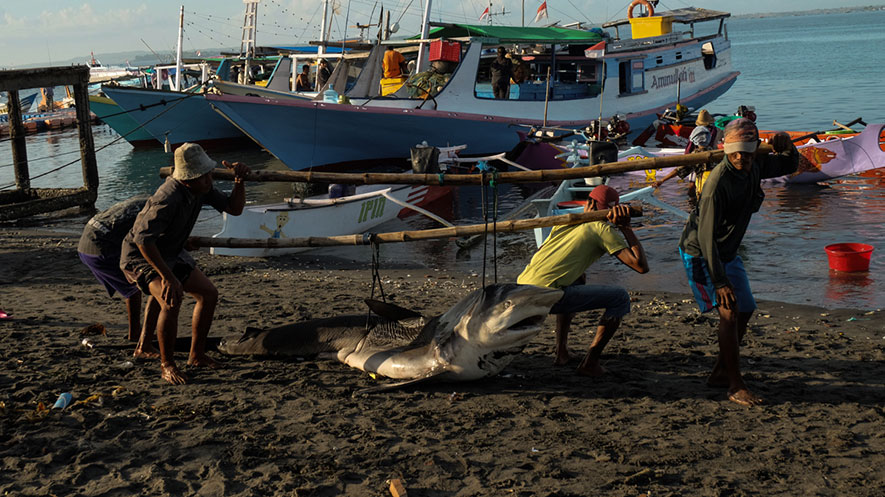Overfishing is the greatest threat facing the health of our fish stocks, and several shark species are particularly vulnerable to overexploitation.
Sharks exhibit complex life strategies that include late sexual maturity, a long reproductive period and in some cases, low fertility. Combined with the profit that can be made from their high-value meat, fins and oil, it comes as no surprise that sharks are one of the most endangered species on the planet. In fact, one in four cartilaginous fishes (which includes sharks, skates, and stingrays) are now threatened with extinction. Fortunately, a study published this month in the journal PLOS One has detailed some steps that can be made to help sustainably manage shark fisheries.
The team of researchers from Bogor Agricultural University, Indonesia, and the University of Rostock, Germany, decided to focus on Indonesia - the world’s largest shark fishing nation - as a place of study. Until recently, shark fishing in Indonesia went relatively unchecked. But in recent years the Indonesian government has begun to focus on shark conservation by implementing sanctions that comply with the Convention on the International Trade in Endangered Species of Wild Fauna and Flora (CITES) - an organization that aims to ensure commercial trade does not threaten wild species. However, CITES only affords protection to a small number of Indonesia’s 112 known shark species, of which 83 are threatened with extinction according to the IUCN Red List of Threatened Species.
Focusing on the Tanjung Luar fish market, the researchers outlined the key characteristics of the fishery including fishing behavior, overall catch volumes, and composition as well as the impacts of different fishing techniques. Their results found that a large proportion of Tanjung Luar’s shark catch consisted of threatened (22 percent) and regulated species (46 percent). The most significant factors influencing the likelihood of catching threatened and regulated species were fishing ground, engine power, hook number, and month due to the seasonal variation in some species.
The study authors provided management advice from their collected data. This included the identification of marine protected areas (MPAs) that protect critical shark habitat and shark populations, which could reduce the catch of species of conservation concern and increase the abundance of sharks. They also suggested that catch efficiency would peak at low to intermediate trip length, intermediate engine power and hook numbers of less than 75 per longline. Therefore, regulations that control the number of hooks, used in combination with incentives for shark fishers to tightly manage the number of hooks they deploy, could significantly reduce mortality of threatened and endangered species, maximise the overall catches of the fishery, and reduce operational costs for fishers, making shark fishing in Tanjung Luar more sustainable and more cost effective.
Lead author Irfan Yulianto and colleagues felt that due to the profitability of the shark industry, and little willingness of shark fishers to move into other industries, it is necessary to identify practical and ethical management interventions that can improve the sustainability of the fishery. Especially as implementing outright bans are unlikely to be enforced and could be detrimental for poor fishing communities across the world.
By Ellis Moloney
Yulianto, I., Booth, H., Ningtias, P., Kartawijaya, T., Santos, J., & Sarmintohadi et al. (2018). Practical measures for sustainable shark fisheries: Lessons learned from an Indonesian targeted shark fishery. PLOS One, 13(11), e0206437. doi: 10.1371/journal.pone.0206437
Data collection of this study was funded by the Darwin Initiative (grant number 2805).



